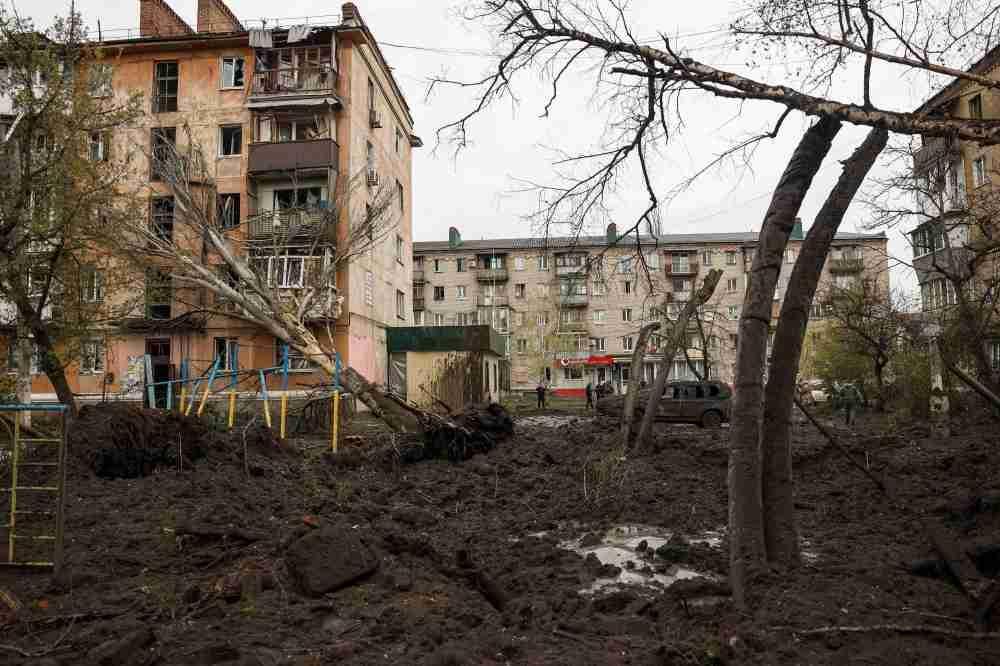
Russia shelled a block of flats in the eastern Ukrainian city of Sloviansk, killing nine people, authorities said Saturday, including a two-year-old boy who was rescued from the rubble but died on his way to hospital.
Friday's strike on the quiet neighbourhood came as Russian President Vladimir Putin signed a bill that will make it easier to mobilise citizens into the army and block them from fleeing the country if drafted.
Russia also said it was pushing further into the hotspot of Bakhmut, 45 kilometres (27 miles) southeast of Sloviansk, which is one of the cities that will be at risk if Kyiv loses the longest and bloodiest battle of the war.
Sloviansk lies in a part of the Donetsk region that is under Ukrainian control. According to Kyiv, it was struck by seven missiles which hit five buildings, five homes, a school and an administrative building.
Vadim Lyakh, the head of Sloviansk's military administration, said Saturday that nine people died -- including a woman whose body was recovered from the rubble overnight -- and 21 were wounded.
Five people were still under the rubble and their identities were established, he said.
AFP journalists saw rescue workers digging for survivors on the top floor of the typical Soviet-era housing block, and black smoke billowing from homes on fire across the street.
"A child died in an ambulance after being pulled out from the rubble," Ukrainian police said on Twitter.
Ukraine's First Lady Olena Zelenska sent her condolences to the child's family during this "indescribable grief".
President Volodymyr Zelensky earlier denounced Russia for "brutally shelling" residential buildings and "killing people in broad daylight".
The street below -- including a playground -- was covered in concrete dust and debris, including torn pages from school books and children's drawings.
"I live on the opposite side of the street and I was sleeping a little when I heard this huge boom and I ran out from my flat," 59-year-old resident Larisa told AFP.
"I was really scared and in a state of shock," she said, adding that the impact of the shelling had broken her windows and sent shards of glass flying throughout her home.
"I heard a woman screaming, 'there's a child here, there's a child here' -- She was screaming so much."
A resident nearby, who declined to give her name, told AFP the strikes had blown out her windows and dislodged her front door from its frame.
"No one from our side of the building was injured but maybe someone here was," she said, pointing to a pool of blood next to another entrance of her building.
More than a year after Moscow launched its offensive in Ukraine, fears are high in Russia that the government is planning a fresh mobilisation drive after a bill was rushed through parliament this week to create a digital draft system.
Under the legislation, which Putin signed Friday, a draftee would be banned from travelling abroad and would have to report to an enlistment office once electronic call-up papers were received.
Tens of thousands of men fled Russia last autumn after Putin announced a mobilisation to prop up the forces in Ukraine.
The strike on Sloviansk, which many residents have fled since Russia invaded, came as Moscow said it was pushing to take more districts of ravaged Bakhmut.
The town has become a fixation of military commanders despite having little strategic value, leading to a brutal nine-month war of attrition.
"Wagner assault units are conducting high-intensity combat operations to conquer the western districts of the city," the Russian army said in a statement, referring to the private paramilitary group.
Russian airborne troops were "providing support to assault squads and halting the enemy's attempts to deliver ammunition to the city and bring in reserves", it added.
Separately, an intelligence source said any pullout from Bakhmut would be slow and gradual because there was only a narrow escape path left.